
In January this year, I wrote a series of articles around rethinking the purpose of the corporation, then moved towards rethinking the “triple bottom line” (that dates from 1994) to the “new triple bottom line”, expressed graphically above. The article that captures that and links to my earlier posts is:
Purpose, People, Planet. The new triple bottom line.
This month, August 2019, the Business Roundtable of CEOs of some of the largest corporations in the USA, published a one-page statement called: “Statement on the Purpose of a Corporation”.
This appears to mark a major shift in thinking, does it indicate that the tide might be turning?
Time to abandon Friedman
In that article of mine on the new triple bottom line, I linked to an earlier post on the purpose and the corporation. One section of that read:
Profit as Ugly Leadership and what Adam Smith really meant
In 1970, Milton Friedman famously said:
“There is one and only one social responsibility of business — to use its resources and engage in activities designed to increase its profits.”
Whilst I can understand any Economist working as an academic taking polarising views such as this, my opinion is that this is ugly leadership in our modern world.
Friedman’s views have broadly been at the centre of capitalist thinking for approaching five decades, and, I argue, has fostered a growing lack of connection to society and planet that has led to symptoms such as radically growing income inequality as well as loss of faith in capitalism as a model and so the rise of ugly populism across the world.
Now, Friedman is thought in this statement to reference the views of the founder of modern Economics, Adam Smith, yet as I outlined in “CEO Pay and Ugly Leadership”, Adam Smith’s work on such concepts as self-interest in “The Wealth of Nations” must always be taken alongside his other great work, “The Theory of Moral Sentiments”.
I consider the absolutist Friedman to be someone who clearly largely apes Smith’s economic thinking while ignoring his moral and societal thinking.
Now, in 2018, Jesse Norman wrote: “Adam Smith: What He Thought, and Why it Matters“, attempting to create a broader sense of how all of Smith’s written works integrate. In “How Adam Smith would fix capitalism” in the FT in June 2018, Norman wrote of Smith’s philosophies :
“markets constitute a socially constructed and evolving order that exists and must exist not by divine right but because it serves the public good.”
So, is it time to abandon Friedman?
Is the tide turning towards the new triple bottom line?
In the WSJ article reporting the new statement by the Business Roundtable, the reporter, Dave Benoit, noted:
“The leaders of some of America’s biggest companies are chipping away at the long-held notion that corporate decision-making should revolve around what is best for shareholders.”
and
“The Business Roundtable’s old statement of purpose espoused economist Milton Friedman’s decades-old theory that companies’ only obligation is to maximize value for shareholders.”
Perhaps the tide is turning, with, driven by shifts in public sentiment in the USA and beyond, CEOs may be finally looking beyond the interests of only shareholders to (as the statement puts it) “all of our stakeholders”.
The sceptic in me sees in the Washington Post article about this topic immediate pushback from those such as institutional investors, saying it is the job of government to look after society.
The optimist considers that some CEOs already are putting Purpose first. As I have written about often, with real examples of such companies who, as the graphic on the new triple bottom line shows, create a “righteous flywheel” of more profit to have more scale of more impact for Purpose, People, Planet. After all, each of these are stakeholders.
Can I help you on this path?
I would say I’m a grounded optimist, so I do firmly believe in the new triple bottom line, in #OpenLeadership, and at the same time, I recognise that this is a journey and it all starts with the desire to drive that brave and transformative change.
I work only with leaders and corporations that recognise, espouse and live the new triple bottom line. If you are on that path and want to do more, easier and faster, or if you feel you can lead that change, I’d love to talk to you.
